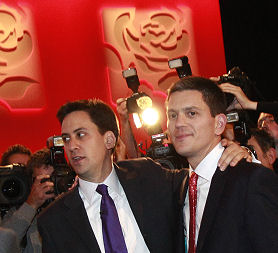Ed wins, what next for Labour?
 Krishnan Guru-Murthy
Presenter
Krishnan Guru-Murthy
Presenter
After months of internal campaigning, Labour will now hope Ed Miliband will increase the pressure on the Coalition Government.

The Labour Party is still taking in the mountain it needs to climb, and after the most sensational leadership election results it still feels a little in shock.
Ed Miliband has declared he is not in the pocket of the unions, with no shift to the left intended. He has begun his leadership saying he wants to reach out to mainstream voters and win back their trust.
But the legacy of the close leadership contest is still uncertain. The party was split down the middle.
But the legacy of the close leadership contest is still uncertain. The party was split down the middle.
We do not know whether David Miliband, who now seems a bigger figure in the party than ever before, will even serve in the shadow cabinet for any length of time. And if he does will he become the focus of dissent every time things go round for the leader?
We don’t know who the shadow chancellor will be. Twenty four hours after Ed Miliband became leader he had still not held a meeting of the current shadow cabinet. He will also have to work hard to shake off the controversy over his election, by the slimmest of margins: just 1.3 per cent.
He lost among the party membership, and among the MP’s but the union votes carried him through. And while he made no deals with the unions, senior figures are already going around saying they did decide to back him in order to stop his older brother David Miliband from becoming party leader.
Now the decision is made it is Ed Miliband who is supposed to be an alternative Prime Minister ready to step into the job if the government falls, and the person who can pick up the pieces of a defeated and tired party in search of new purpose.
It will be a job much harder than the leadership contest has suggested. For while all the leadership candidates admitted some fairly nuanced differences, they have all conspired to gloss over the considerable gulf that still exists within the Labour Party.
The contest has seen all the candidates pretend they have shed the old allegiances and thinking of the Blair and Brown years but many in the Labour Party are still in truth defined by it. Many of Ed’s supporters are former Brownites, many who now privately have grave concerns about him are former Blairites. So the task facing Ed is much more complex than they have all had us believe.
So the task facing Ed is much more complex than they have all had us believe.
The impact of spending cuts will be critical to Ed Miliband’s future. If the British public react in anger Labour could move ahead of the Conservatives in the opinion polls. Coming from relatively low expectations will be even better for Ed Miliband if he can achieve and hold a high poll rating for any length of time.
But if voters blame the cuts, as the Coalition will argue they should, on the last Labour Government the party could struggle to find traction. If it finds itself constantly having to defend its record it will struggle to attack the new Coalition.
Add to all this the likelihood that by the scheduled time of the next election the economic situation could be quite different to how it feels now. The pain might still be felt, but it could be dimming. The ‘tough decisions” politicians always like to talk about might seem to many voters like medicine we had to take.
It is always hard in retrospect to prove a policy was unnecessary. Bucking the trend of defeated Labour Parties who spend long periods in opposition, tearing themselves apart, is an enormous task.
We will soon see whether Ed Miliband can define what he means when he says “I’m my own man”.




